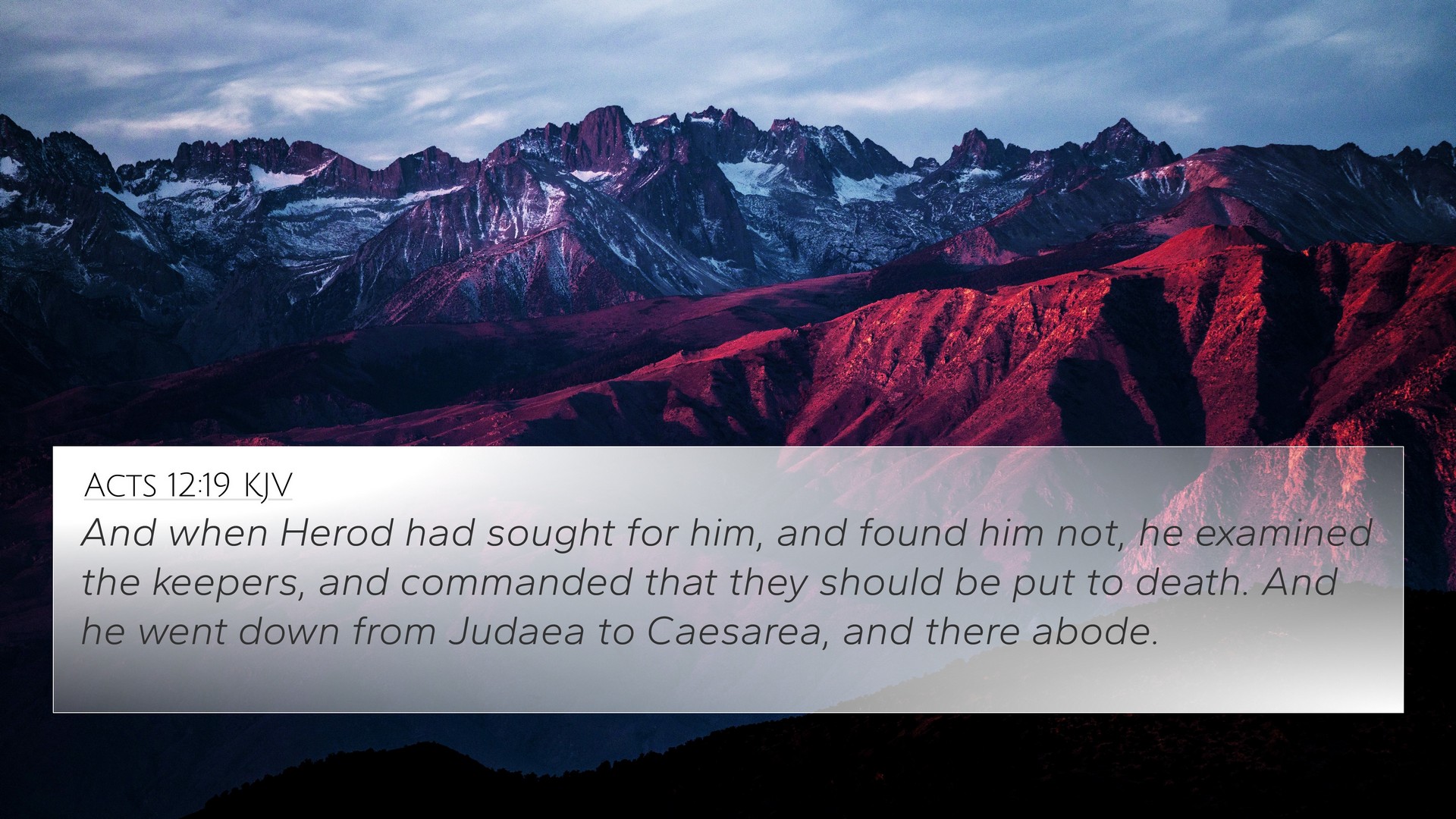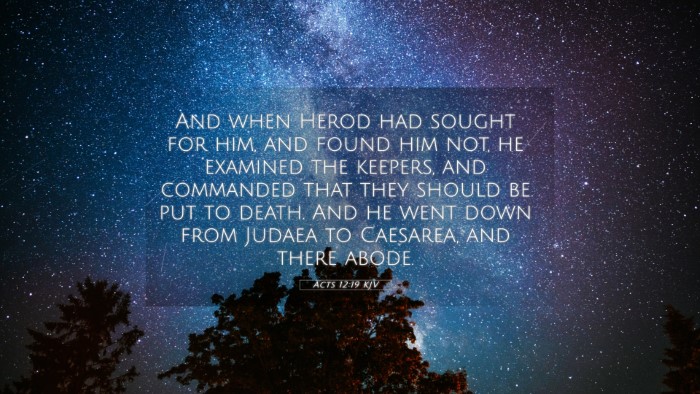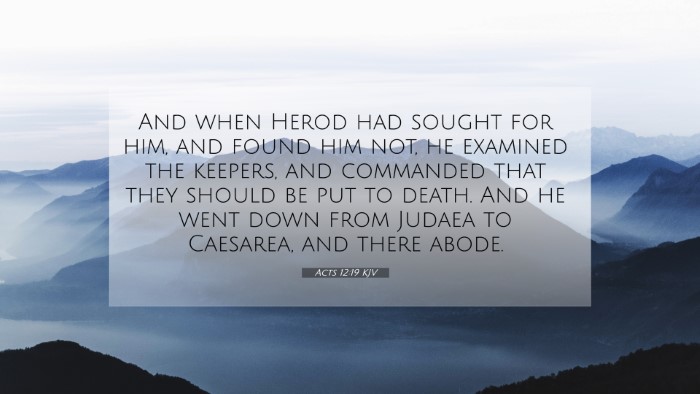Old Testament
Genesis Exodus Leviticus Numbers Deuteronomy Joshua Judges Ruth 1 Samuel 2 Samuel 1 Kings 2 Kings 1 Chronicles 2 Chronicles Ezra Nehemiah Esther Job Psalms Proverbs Ecclesiastes Song of Solomon Isaiah Jeremiah Lamentations Ezekiel Daniel Hosea Joel Amos Obadiah Jonah Micah Nahum Habakkuk Zephaniah Haggai Zechariah MalachiActs 12:19 Similar Verses
Acts 12:19 Cross References
And when Herod had sought for him, and found him not, he examined the keepers, and commanded that they should be put to death. And he went down from Judaea to Caesarea, and there abode.
Uncover the Rich Themes and Topics of This Bible Verse
Listed below are the Bible themes associated with Acts 12:19. We invite you to explore each theme to gain deeper insights into the Scriptures.
Acts 12:19 Cross Reference Verses
This section features a detailed cross-reference designed to enrich your understanding of the Scriptures. Below, you will find carefully selected verses that echo the themes and teachings related to Acts 12:19 KJV. Click on any image to explore detailed analyses of related Bible verses and uncover deeper theological insights.
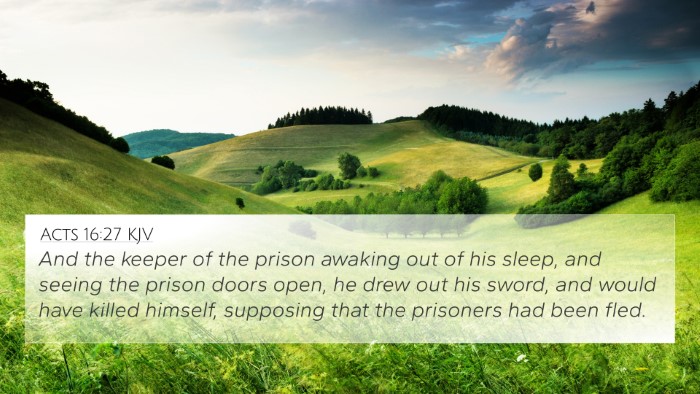
Acts 16:27 (KJV) »
And the keeper of the prison awaking out of his sleep, and seeing the prison doors open, he drew out his sword, and would have killed himself, supposing that the prisoners had been fled.

1 Samuel 23:14 (KJV) »
And David abode in the wilderness in strong holds, and remained in a mountain in the wilderness of Ziph. And Saul sought him every day, but God delivered him not into his hand.
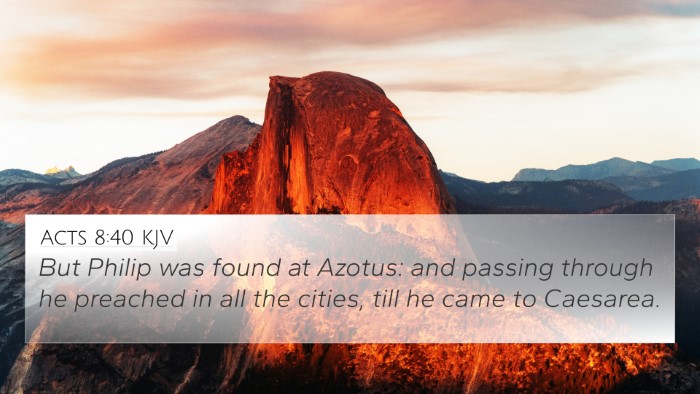
Acts 8:40 (KJV) »
But Philip was found at Azotus: and passing through he preached in all the cities, till he came to Caesarea.
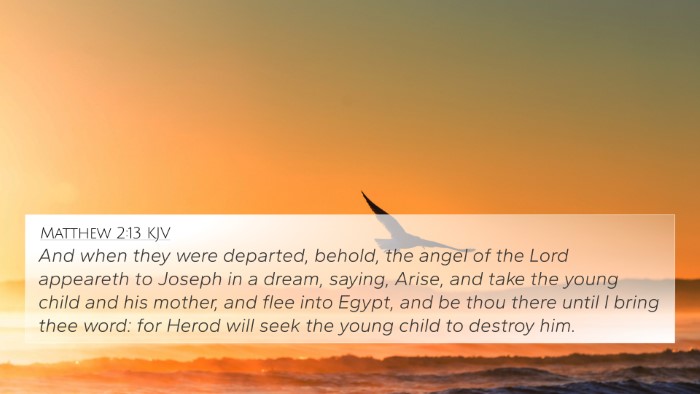
Matthew 2:13 (KJV) »
And when they were departed, behold, the angel of the Lord appeareth to Joseph in a dream, saying, Arise, and take the young child and his mother, and flee into Egypt, and be thou there until I bring thee word: for Herod will seek the young child to destroy him.
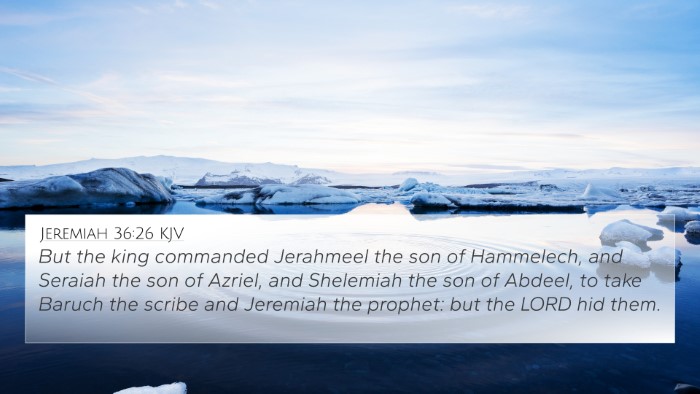
Jeremiah 36:26 (KJV) »
But the king commanded Jerahmeel the son of Hammelech, and Seraiah the son of Azriel, and Shelemiah the son of Abdeel, to take Baruch the scribe and Jeremiah the prophet: but the LORD hid them.
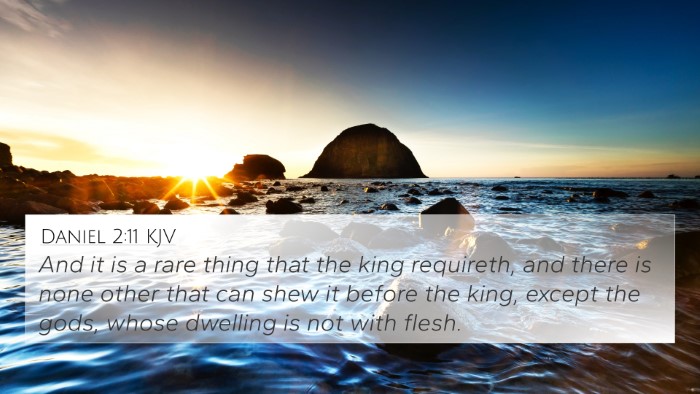
Daniel 2:11 (KJV) »
And it is a rare thing that the king requireth, and there is none other that can shew it before the king, except the gods, whose dwelling is not with flesh.

Acts 27:42 (KJV) »
And the soldiers' counsel was to kill the prisoners, lest any of them should swim out, and escape.

1 Kings 20:43 (KJV) »
And the king of Israel went to his house heavy and displeased, and came to Samaria.
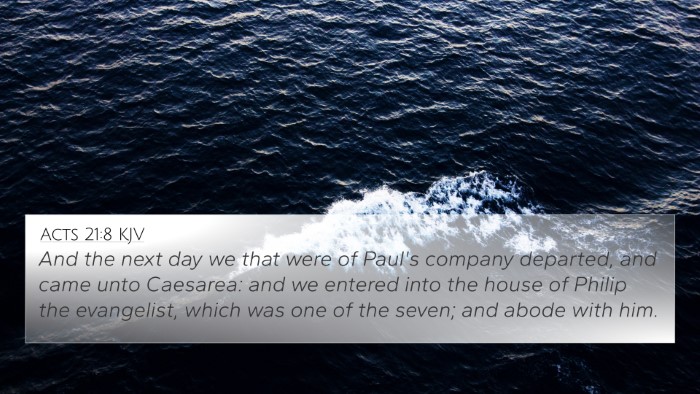
Acts 21:8 (KJV) »
And the next day we that were of Paul's company departed, and came unto Caesarea: and we entered into the house of Philip the evangelist, which was one of the seven; and abode with him.
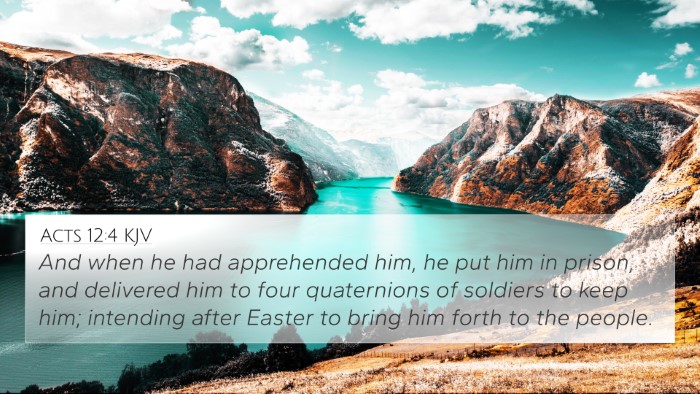
Acts 12:4 (KJV) »
And when he had apprehended him, he put him in prison, and delivered him to four quaternions of soldiers to keep him; intending after Easter to bring him forth to the people.
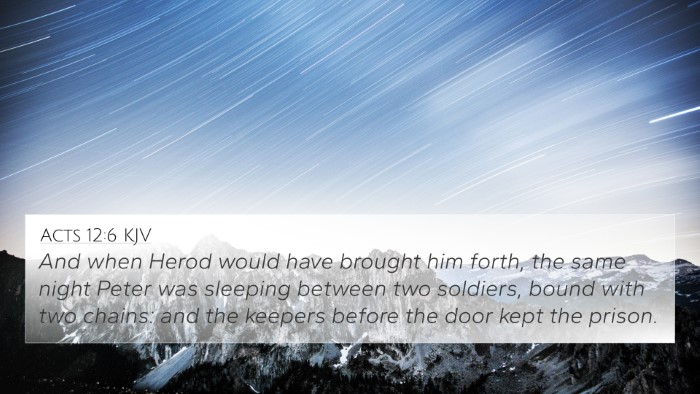
Acts 12:6 (KJV) »
And when Herod would have brought him forth, the same night Peter was sleeping between two soldiers, bound with two chains: and the keepers before the door kept the prison.
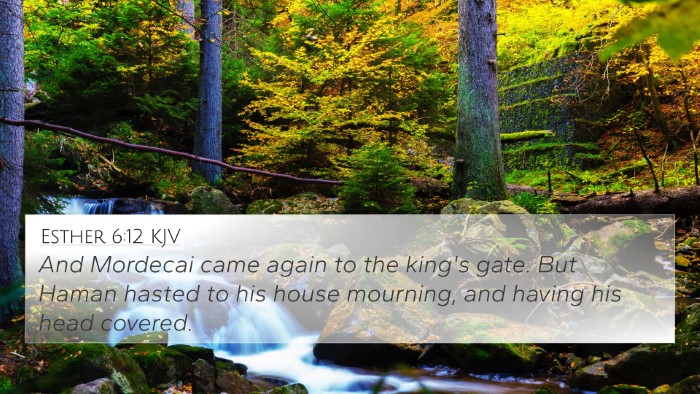
Esther 6:12 (KJV) »
And Mordecai came again to the king's gate. But Haman hasted to his house mourning, and having his head covered.
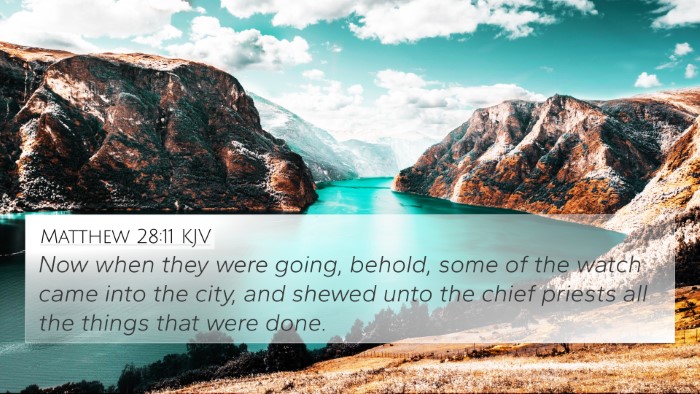
Matthew 28:11 (KJV) »
Now when they were going, behold, some of the watch came into the city, and shewed unto the chief priests all the things that were done.
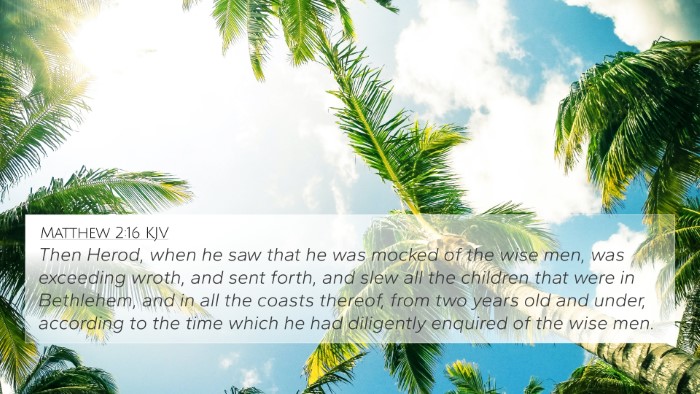
Matthew 2:16 (KJV) »
Then Herod, when he saw that he was mocked of the wise men, was exceeding wroth, and sent forth, and slew all the children that were in Bethlehem, and in all the coasts thereof, from two years old and under, according to the time which he had diligently enquired of the wise men.
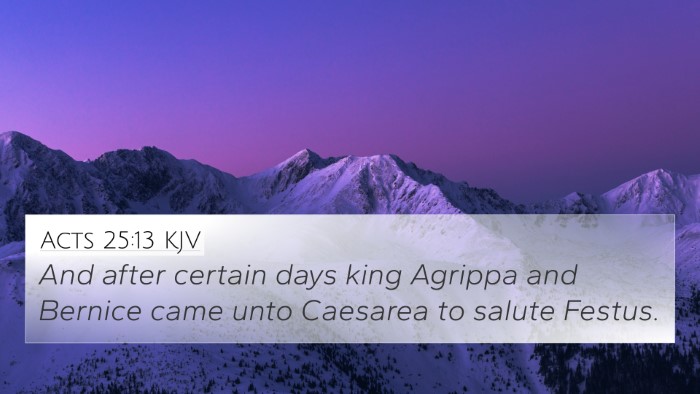
Acts 25:13 (KJV) »
And after certain days king Agrippa and Bernice came unto Caesarea to salute Festus.
Acts 12:19 Verse Analysis and Similar Verses
Understanding Acts 12:19
Acts 12:19 (KJV): "And when Herod had sought for him, and found him not, he examined the keepers, and commanded that they should be put to death. And he went down from Judea to Caesarea, and there abode."
This verse occurs within a profound narrative illustrating the power of God in delivering His people, specifically Peter, from prison, as well as highlighting the cruelty and folly of King Herod. The implications and lessons from this verse can be explored through various commentaries, including insights from Matthew Henry, Albert Barnes, and Adam Clarke.
Summary of Insights
Examination of Herod's Actions
Matthew Henry's Commentary: Henry emphasizes Herod's ruthlessness and desperation. After failing to apprehend Peter, he assumes a posture of vengeance against the guards, showcasing the typical tyranny displayed by rulers who are thwarted. He notes the irony of Herod’s actions: instead of fearing God, he punishes those who served him, reflecting a deep moral depravity.
Albert Barnes' Notes: Barnes adds that Herod’s execution of the guards reveals the harshness of Roman justice and the fear that rulers had of appearing weak. His inability to find Peter led him to an immediate and violent reaction instead of seeking repentance or understanding the situation at hand.
Adam Clarke's Commentary: Clarke brings forth the aspect of Herod moving to Caesarea, indicating a tactical retreat from his failed pursuit. He also points out that Herod's actions put him at odds with divine authority, which ultimately leads to his demise, showcasing the consequences of defying God's will.
Theological Implications
This narrative offers insights into the nature of authority, the theme of divine deliverance, and the consequences of pride and evil. It opens up discussions on:
- The role of divine intervention: Peter's escape illustrates the power of God over human plans.
- The nature of justice: The unjust punishment of the guards raises questions about moral accountability among those in power.
- The futility of opposing God's will: Herod’s actions ultimately lead to his downfall, connecting with various other scriptural themes of divine retribution.
Cross-References and Related Verses
Acts 12:19 is rich in connections with other verses, and a few pertinent cross-references include:
- Exodus 12:29-30: God's judgment on Egypt serves as a backdrop for understanding Herod’s eventual judgment.
- Matthew 2:16-18: Herod's past murderous actions resonate with his current tyranny.
- Romans 13:1-4: The discussion of authority and governance highlights the moral obligations of rulers.
- Acts 5:39: The importance of recognizing God’s purpose in opposition instead of rebellion against His will.
- Psalm 37:12-13: A reminder of the fate awaiting the wicked, reflecting God’s justice.
- 2 Peter 2:9: Assurance of God's ability to deliver the righteous while reserving the wicked for judgment.
- James 4:10: An exhortation to humility, contrasting Herod’s pride with the call to submit to God’s authority.
Connections Between Bible Verses
The connections between various Bible verses deepen our understanding of the themes present in Acts 12:19. These connections can be utilized as tools for Bible cross-referencing, helping to grasp the full context of the scripture:
- Linking Bible scriptures helps unveil the overarching narrative of God's sovereignty.
- Comparative Bible verse analysis enriches the understanding of authority and the consequences of oppression.
- Bible verses that relate to each other demonstrate the consistent theme of divine justice throughout scripture.
- Cross-referencing Biblical texts reveals the character of God against the backdrop of human folly.
- Thematic Bible verse connections allow for a comprehensive study of faith, authority, and divine retribution.
Tools for Bible Cross-Referencing
To effectively engage in cross-referencing Bible verses, consider the following tools and resources:
- Bible concordance: A resource that categorizes scripture for ease of study.
- Bible cross-reference guide: Tools designed to help you find related scripture and themes quickly.
- Bible reference resources: Comprehensive materials that detail scripture context and association.
- Cross-reference Bible study methods: Approaches to intertwine scriptures for deep study.
- Identifying connections between Old and New Testament: Helps to see the continuity and fulfillment of scriptures.
Conclusion
Acts 12:19 encapsulates essential themes of divine justice, authority, and deliverance. It invites readers to reflect on the intersections of biblical narratives and prompts a deeper exploration through the lens of comprehensive Bible cross-referencing. Engaging with this verse through the eyes of esteemed commentaries fosters a richer understanding of God's sovereign plan and the folly of man.
